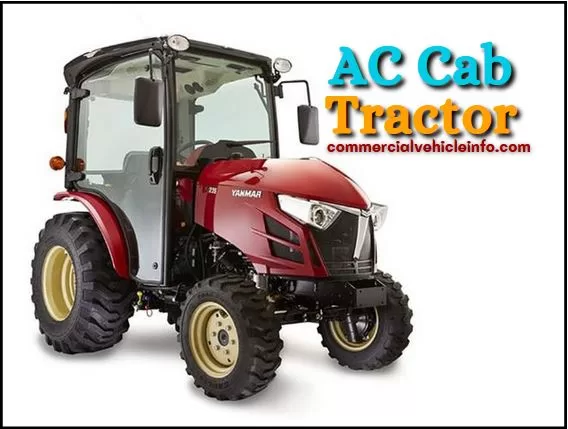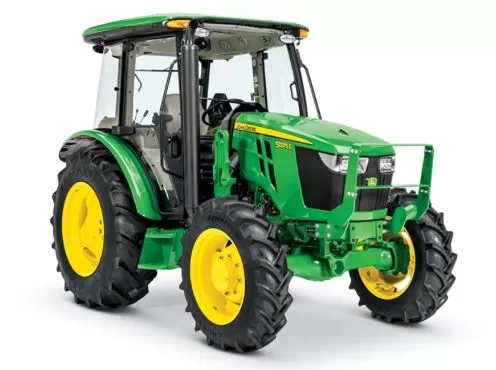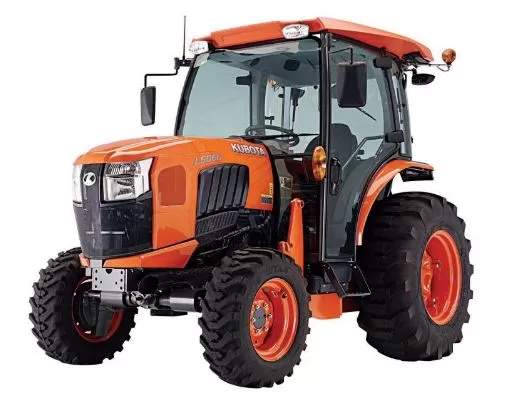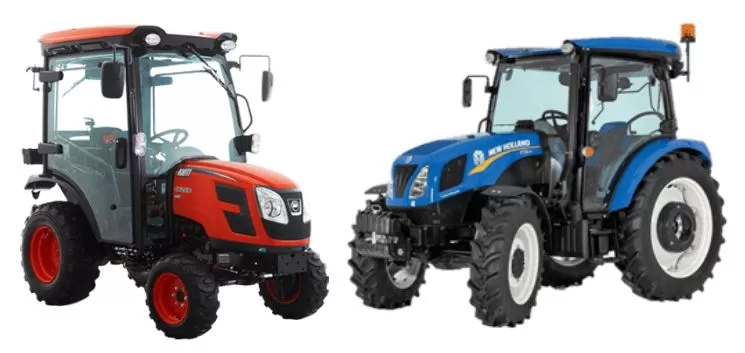AC Cab Tractors play a pivotal role in contemporary agriculture and farming, serving as indispensable tools. They furnish operators with a secure and comfortable workspace, concurrently enhancing both productivity and efficiency.
This piece will delve into the attributes, advantages, and upkeep of AC cab tractors, along with guidance on selecting the optimal fit for individual requirements.
What is an AC Cab Tractor?
AC cab tractors stand as vital agricultural vehicles, incorporating air-conditioned cabs designed to ensure driver comfort during field operations.
The cabs are generously glazed, potentially leading to heat retention, and often lack ventilating windows. Consequently, the air-conditioning system assumes a pivotal role in upholding a pleasant cab temperature, a necessity given the demanding surroundings and dust exposure inherent to tractor usage.
The ascent of AC cab tractors in farmers’ esteem can be attributed to their merits, encompassing heightened operator well-being and safety, particularly in challenging conditions.
What are the different types of AC cab tractors?
AC cab tractors are available in a variety of models that are designed to perform specific jobs. Here are some varieties of AC tractor cabs that are available:
- John Deere Tractors: John Deere offers an array of AC cab tractors, such as the 6000 Series and 8000 Series as well as row-crop tractors, such as the 8120/8120T and the 8520/8520T.
- AGCO Tractors: AGCO offers track tractors, articulated four-wheel drive tractors utility tractors, specialty tractor models, and compact tractors.
- Kubota Tractor: Kubota offers sub-compact and utility, agriculture, and compact tractors like the Grand L60 Series and the MX Series.
- Bobcat Tractor: Bobcat offers compact tractors that have a hydrostatic or manual transmission as well as enclosed cab models as well as a three-point lift capacity of up to 1,631 pounds.
Every kind of AC tractor with a cab comes with distinctive characteristics and advantages, making it crucial to select the appropriate one to meet your particular needs.
Benefits of an AC Cab Tractor
- Enhanced Work Environment: AC cab tractors establish a work environment marked by comfort, enabling operators to extend their work hours without discomfort. The cab interior features air conditioning and heating systems, ensuring a pleasant temperature in any weather. This elevates operator efficiency and mitigates fatigue.
- Elemental Shield: The enclosed cab of an AC cab tractor provides a shield against elements like extreme temperatures, rain, snow, and dust. This permits operators to operate in demanding weather conditions without exposure. It also safeguards them from seasonal pests, pollen, and noise, contributing to their overall well-being and safety.
- Debris Minimization: The sealed cab design of AC cab tractors curtails the intake of debris, promoting healthier lung conditions for operators. It prevents the intrusion of dust, pollen, and other airborne particles, fostering a cleaner and more healthful working atmosphere.
- Enhanced Operator Safety: AC cab tractors are often outfitted with safety enhancements like roll-over protection and seat belts, amplifying operator safety and reducing the likelihood of accidents or injuries during tractor operation.
- Weather Versatility: Possessing an AC cab tractor empowers operators to engage in work across an array of weather conditions, spanning extreme heat to cold. This adaptability facilitates year-round activity and ensures task completion, irrespective of atmospheric conditions.
- Elevated Productivity: The comfort and safeguarding provided by AC cab tractors drive heightened operator productivity. Operators can concentrate on their duties without being hampered by unfavorable weather or external influences, culminating in more streamlined and effective work.
- Enhanced Resale Value: AC cab tractors typically command a higher resale value compared to open station tractors. The augmented comfort and convenience attributed to the cab render them more appealing in the secondary tractor market.
John Deere Tractor with Air Conditioning
John Deere, a renowned tractor brand, presents a variety of AC cab tractors, including the 6000 and 8000 Series, as well as row crop models like the 8120/8120T and 8520/8520T.
These tractors are gaining popularity among farmers for improved comfort and safety in challenging conditions.
With glass-rich cabs that can trap heat and limited ventilation, the pivotal air-conditioning system maintains a cozy interior amid harsh conditions and dust exposure. Maintaining the AC system is crucial for its efficiency and longevity.
New John Deere Tractor with Air Conditioning Price
| Model | Price (USD) |
| 6120B | $98,000 |
| 6130B | $105,000 |
| 6140B | $112,000 |
| 6150B | $119,000 |
| 6175M | $135,000 |
| 6215R | $159,000 |
| 6230R | $175,000 |
| 6250R | $189,000 |
| 6270R | $203,000 |
| 6330R | $235,000 |
John Deere AC Cab Tractor Specifications
| Model | Engine | Transmission | PTO HP |
Fuel Tank Capacity
|
| 6120B | 4.5L PowerTech PSS 4-cylinder | 16F/16R PowerShift | 102 |
163 liters (43 US gal)
|
| 6130B | 4.5L PowerTech PSS 4-cylinder | 16F/16R PowerShift | 112 |
163 liters (43 US gal)
|
| 6140B | 4.5L PowerTech PSS 4-cylinder | 16F/16R PowerShift | 122 |
163 liters (43 US gal)
|
| 6150B | 4.5L PowerTech PSS 4-cylinder | 16F/16R PowerShift | 132 |
163 liters (43 US gal)
|
| 6175M | 6.8L PowerTech PSS 6-cylinder | 20F/20R PowerShift | 157 |
195 liters (52 US gal)
|
| 6195M | 6.8L PowerTech PSS 6-cylinder | 20F/20R PowerShift | 177 |
195 liters (52 US gal)
|
| 6215R | 6.8L PowerTech PSS 6-cylinder | 20F/20R PowerShift | 197 |
195 liters (52 US gal)
|
| 6230R | 6.8L PowerTech PSS 6-cylinder | 20F/20R PowerShift | 212 |
195 liters (52 US gal)
|
| 6250R | 6.8L PowerTech PSS 6-cylinder | 20F/20R PowerShift | 232 |
195 liters (52 US gal)
|
| 6270R | 6.8L PowerTech PSS 6-cylinder | 20F/20R PowerShift | 252 |
195 liters (52 US gal)
|
Kubota Tractor with Air Conditioning
Kubota, a renowned brand, presents a diverse tractor lineup, including air-conditioned models. Tractor cabs, abundant in glass, can accumulate heat and often lack ventilating windows.
Thus, the air conditioning system becomes essential for a cozy cab temperature, especially amidst rigorous conditions and dust exposure.
Kubota’s offerings span sub-compact, agriculture, utility, and compact tractors, like the Grand L60 Series and MX Series, featuring air conditioning and driver-comfort enhancements for fieldwork.
New Kubota Tractor with Air Conditioning Price
| Model | Base Price |
| L4208 | $26,079 |
| L4701 | $29,479 |
| L5708 | $34,199 |
| L6030 | $39,229 |
| M5040 | $45,499 |
| M5740 | $54,399 |
| M7140 | $68,599 |
| M9540 | $96,299 |
The price of a Kubota ZD1211 with a cab varies depending on the type of cab and the dealer. Kubota zd1211 with cab price is $19,999.00.
Kubota Cab Tractor Specifications
| Model | Engine | Transmission | PTO HP |
Fuel Tank Capacity
|
| L4208 | 3.3L D1105-E3B 3-cylinder | 12F/12R Syncro Shuttle | 17 |
28 liters (7.4 US gal)
|
| L4701 | 3.8L D1305-E3B 3-cylinder | 16F/16R Syncro Shuttle | 23 |
34 liters (8.5 US gal)
|
| L5708 | 4.4L D1703-E4B 3-cylinder | 16F/16R Syncro Shuttle | 31 |
40 liters (10.6 US gal)
|
| L6030 | 4.4L D1703-E4B 3-cylinder | 16F/16R Syncro Shuttle | 34 |
40 liters (10.6 US gal)
|
| M5040 | 4.0L V2203-M-DI 3-cylinder | 12F/12R Syncro Shuttle | 41 |
40 liters (10.6 US gal)
|
| M5740 | 4.6L V2403-M-DI 3-cylinder | 16F/16R Syncro Shuttle | 50 |
48 liters (12.7 US gal)
|
| M7140 | 4.8L V2603-M-DI 4-cylinder | 16F/16R PowerShift | 63 |
68 liters (18.0 US gal)
|
| M9540 | 6.0L V3800-M-DI 4-cylinder | 16F/16R PowerShift | 85 |
78 liters (20.7 US gal)
|
Smallest Tractor with Air Conditioning
The Kioti CX2510 HST Cab is a tractor model that features a deluxe cab with air conditioning, heat, and a stereo system.
It has a 24.5 horsepower engine and a hydrostatic transmission with twin-pedal operation. The tractor also has a tilt wheel with power steering, making it easy to make tight turns.
The New Holland T4050 is another tractor model that features a 95 horsepower engine and a 12×12 power shuttle transmission.
It has a spacious cab with air conditioning and heat, as well as a deluxe air suspension seat for operator comfort. Both tractors are designed for agricultural and farming tasks.
New Smallest Tractor with Air Conditioning Price
Kioti cx2510 hst cab price: $35,999
New Holland T4050 price: $38,999
Smallest Tractor with Air Conditioning Specification
| Specification | Kioti CX2510 HST Cab |
New Holland T4050
|
| Engine | 3-cylinder, 1647cc, diesel |
4-cylinder, 3402cc, diesel
|
| Horsepower | 25 | 40 |
| PTO horsepower | 21 | 33 |
| Transmission | Hydrostatic | Powershift |
| Fuel tank capacity | 28 liters (7.4 US gal) |
36 liters (9.5 US gal)
|
| Weight | 1,650 kg (3,638 lb) |
1,880 kg (4,145 lb)
|
| Width | 1,960 mm (77.2 in) |
2,130 mm (83.9 in)
|
| Length | 3,360 mm (132.3 in) |
3,700 mm (145.7 in)
|
| Ground clearance | 300 mm (11.8 in) |
340 mm (13.4 in)
|
| Cab features | Air conditioning, heating, soundproofing |
Air conditioning, heating, soundproofing
|
How to Choose the Right AC Cab Tractor?
Selecting the ideal AC cab tractor necessitates thoughtful deliberation across multiple aspects. Here are some pointers to guide your decision-making process:
- Gauge your farm’s dimensions and required tasks to match the tractor’s capabilities.
- Analyze the topography and soil conditions for an optimal tractor fit.
- Factor in your budget and compare costs among various AC cab tractor options.
- Decide between a factory-installed cab and an aftermarket alternative.
- Seek attributes like air conditioning, radios, and color-coded controls for ease.
- Consider your proficiency level; opt for fewer controls if you’re a novice.
- Factor in future resale value while finalizing your choice.
By weighing these factors, you can confidently select the right AC cab tractor, ensuring an advantageous investment aligned with your needs.
What are some common maintenance tasks for AC Cab Tractors?
Sustaining the optimal performance and longevity of an AC cab tractor hinges on diligent maintenance. Consider these upkeep guidelines:
- Routinely cleanse and inspect the AC system to maintain seamless operation. Accumulated dirt and debris can impede efficiency.
- Regular oil and filter changes are essential to purify the engine and uphold its smooth operation.
- Tire care guarantees proficient traction and handling. Monitor tire pressure consistently and replace worn tires as required.
- Preserve the battery to ensure dependable starts. Periodically examine terminals for corrosion and clean as necessary.
- Winterize the tractor to safeguard its engine and components from frigid conditions. This entails fuel tank drainage and antifreeze addition to the cooling system.
- Thorough AC system maintenance is crucial. Regularly clean and inspect the evaporator and heater cores, service the housing, and adjust the belt for optimal operation.
AC Cab Tractor Advantages and Disadvantages
The advantages of using an AC Cab Tractor:
- An environment that is comfortable for the user, particularly when it is hot and humid.
- Increased safety of operators and reduced the risk of accidents.
- Improved efficiency and productivity which results in higher yields for crops and greater profits.
- Protection from elements such as snow, dust, rain, and insects.
The disadvantages of using an AC Cab Tractor:
- The costs of initial purchase are higher than open station tractors.
- Maintenance and repairs can be expensive.
- AC cab tractors might not be required in smaller farm operations or that have less heavy workloads.
Overall AC cab tractors have numerous benefits for farmers, such as increased convenience, safety, and efficiency. However, the costs and maintenance requirements must be considered prior to making a purchase.
What is the history of the AC Cab Tractor?
The origins of AC cab tractors can be traced back to the early 20th century when the initial farm tractors emerged, making their debut in the market between 1914 and 1919.
Nevertheless, it wasn’t until the 1960s that the concept of a factory-installed cab was pioneered by Stolper Industries, specifically for Allis-Chalmers’s One-Ninety model.
From that point onward, AC cab tractors have experienced a surge in popularity, as numerous manufacturers now provide air-conditioned cabs as either standard or optional features.
In the present day, AC cab tractors have evolved into indispensable tools for contemporary agriculture and farming. They create a comfortable and secure workspace for operators, ultimately amplifying both productivity and efficiency.
Conclusion
In contemporary agriculture and farming, AC Cab tractors play a vital role. They establish a secure and pleasant workspace for operators, concurrently bolstering productivity and efficiency.
With insights into the attributes, advantages, and maintenance of these tractors, farmers can adeptly select the optimal match for their requirements and ensure prolonged smooth operation.
For more details visit the commercialvehicleinfo.com.
AC Cab Tractor FAQs
Features of an AC cab tractor include air conditioning, comfortable seating, soundproofing, GPS and other advanced technology, safety features, and fuel efficiency.
When choosing an AC cab tractor, it is important to consider the size of your farm, the tasks you need the tractor to perform, the terrain and soil conditions, and your budget.
Yes, there are AC cabs available for zero turn mowers, providing cooling and operator comfort during mowing.
The air conditioning system in an AC cab tractor operates like those found in everyday cars and trucks, with refrigerant helping to move the heat out.
The best brand of AC cab tractor depends on your specific needs and preferences, but some popular brands include John Deere, Kubota, and New Holland.
AC cab tractors can be used for some types of construction work, but they are primarily designed for agricultural and farming tasks.
With proper maintenance, AC cab tractors can last for many years, with some models lasting up to 20 years or more.
Common maintenance tasks for AC cab tractors include regular cleaning and inspection, oil and filter changes, tire maintenance, battery maintenance, and winterization.
To winterize your AC cab tractor, you should drain the fuel tank and replace it with fresh fuel, change the oil and filter, check the battery and replace it if necessary, and store the tractor in a dry, covered area.
The main difference between an AC cab tractor and a regular tractor is the presence of an air-conditioned cab for the operator’s comfort.
To increase the resale value of your AC cab tractor, you should perform regular maintenance, keep it clean and well-maintained, and consider adding any additional features or upgrades that may increase its value.



